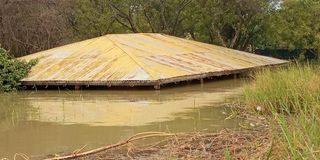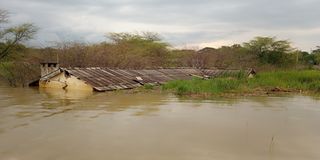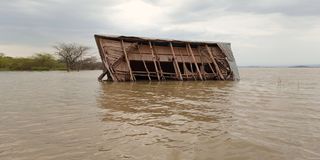Premium
Thousands displaced as lakes swell after heavy downpour

A residential house at the shores of Lake Baringo submerged by increasing water levels at Lake Baringo.More than 4,000 locals bordering the Lake have been displaced.
What you need to know:
- Many companies hold their conferences and seminars at the hotel owing to its serenity. It also hosts tourists who tour the world-famous lake.
- At Block Hotels, the Nation found monkeys resting on the rooftops of the famous tourism hotel as hippos grazed nearby.
Thousands of people have been displaced, crops destroyed and roads rendered impassable by a drastic rise in water levels in Lake Baringo following a heavy downpour.
The resultant floods have also left Lake Bogoria and Lake 94 (the latter formed in 1994 after river Molo and Perkerra burst their banks) swollen.
The raging waters have swept away crops in the Perkerra and other irrigation schemes around the county, with devastating implications for food security.
Hotels and other public amenities are a no-go-zone, further crippling the tourism sector after months of restriction of movement around the world due to the Covid-19 pandemic.
Residents expressed fears that the three major lakes in the county could be joining up to form one giant water body that would permanently displace even more families.
According to experts, Lake Baringo has expanded from 236 square kilometres in 2015 to approximately 260 square kilometres, posing a threat to adjacent homesteads and public amenities.
Lake Bogoria has also swollen from 34 square kilometres to approximately 45 square kilometres in just one month, submerging major roads leading to the national park, Loboi dispensary and Lake Bogoria Girls Secondary School.

Staff houses belonging to fisheries department at the shores of Lake Baringo marooned by rising water after levels at the lake.
A humanitarian crisis is looming, with more than 4,000 having had to seek refuge in temporary camps in safer villages after their houses were swallowed up by the lake waters.
More than 600 lakeside houses have already been submerged in water and the numbers are expected to rise should the rainfall persist.
Among the worst-hit villages are Loruk, Noosukro, Kokwa island, Kampi Samaki, Sokotei, Lorok, Kiserian, Ruggus, Loitip, Mukutani ndogo, Ng’ambo, Sintaan, Salabani, Ilng’arua, Loboi and Longeiwan.
A spot check by the Nation revealed that most of the affected villages could only be accessed by boats after major roads and houses were destroyed by the lake waters. This came as locals scrambled to salvage what they could of their belongings, which they canoed to safer places.
On Kokwa Island in Lake Baringo, two villages have been completely cut off from social amenities such as hospitals, shops and schools after a bridge constructed by the county government in 2015 to connect the two islands was completely submerged in water.
The bridge had been erected approximately 10 metres above the water level, but it is now completely submerged.
Mr Fredrick Lenasieku, one of the affected residents, said the water level in the lake has been rising every day since March this year, submerging more than 30 houses on the island in a phenomenon that has never been witnessed before.
“We woke up one morning to find our house inside the lake. I have a week-old baby and my old grandmother is also at risk. This has forced us to seek temporary refuge at the teachers’ quarters at Kokwa Primary School as we look for an alternative,” said Mr Lenasieku.
He also expressed fears of crocodile and hippo attacks.
“It is very dangerous because our houses are now close to the crocodile- and hippo-infested lake. The animals like to bask in the shallow areas, near our houses. We are forced us to lock children inside the houses for fear of attacks,” he added.
According to Mr Wilson Lemkut, a village elder, more than 2,000 residents of the Island have been affected.
“We have been cut off from hospitals and shops after the bridge submerged. Expectant women and children are now at risk because they cannot get services. It is very dangerous to go to the mainland especially at night due to the risk posed by heavy tides and the marauding hippos,” said Mr Lemkut.
In the neighbouring Noosukro village, on the shores of the lake, more than 60 houses are submerged in the lake. The affected families have been forced to seek refuge at Noosukro Primary School, though it is also on the verge of being submerged.
Security officers at Noosukro Rapid Deployment Unit (RDU) camp have also been relocated after the entire camp was marooned.
The floodwater has also blocked off major roads that are used for security patrols in the banditry-prone area, raising fears of the residents’ safety should an attack happen.
Soi Safari Lodge, Roberts Camp, Lake Breeze and Block Hotel on the shores of Lake Baringo are staring at heavy losses after the lake burst its banks, leaving hundreds of rooms and cottages engulfed in floodwaters.
At Roberts Camp, which normally generates more than Sh20 million annually, workers were using boats to salvage their property from the submerged hotel.

Staff houses belonging to fisheries department at the shores of Lake Baringo marooned by rising water after levels at the lake.
According to the hotel’s manager, Mr James Owuor, everything at the hotel including the main restaurant, cottages, bandas and the owner’s house have completely been submerged in water, rendering 20 workers jobless.
“We’ve been experiencing this problem since 2012, but this is the worst case as we’ve lost everything. We call on the government and other well-wishers to assist us because this has been a major investment in this region supporting the local economy,” said Mr Owuor.
The situation is not different at Soi Safari Lodge, where the lake water has submerged more than 50 rooms and conference facilities, with more than 100 workers likely to lose their jobs.
Hotel Manager Peter Chebii noted that the rise in water levels has affected their operations just as they were resuming operations after closing for many months due to the Covid-19 pandemic.
“We were planning to reopen the facility after closing down for three months,” said Mr Chebii.
Many companies hold their conferences and seminars at the hotel owing to its serenity. It also hosts tourists who tour the world-famous lake.
It was the same thing at Lake Breeze hotel and Tumbili Cliff.
At Block Hotels, the Nation found monkeys resting on the rooftops of the famous tourism hotel as hippos grazed nearby.
Early this year, more than a million flamingoes migrated to the lake after breeding in Lake Natron in Tanzania, the largest number of the birds ever recorded in East and Central Africa.
However, thousands have migrated to Lake Nakuru, Elementaita and Lokipi in Turkana, thanks to the drastic rise in water levels at Lake Bogoria, which has greatly hampered their feeding and where they perch.
In January this year, more than a million of the birds migrated to Lake Bogoria earlier than anticipated, making it the only lake in Rift Valley hosting flamingoes back then.
The unique spectacle usually takes place in May, when the lake hosts half the population of the world’s flamingoes after breeding in Tanzania in November. The birds usually return to Tanzania in mid-June.
According to the national reserve’s senior warden James Kimaru, the drastic rise in the lake’s water level has led to an exodus of the flamingoes to Lakes Nakuru, Elementaita and Lokipi in Turkana County.
The warden noted that the number of birds has drastically fallen from millions to approximately 300,000.
“We were banking on reaping big from the tourism sector this year after millions of flamingoes migrated to the lake from Tanzania in January; earlier than anticipated. We have never received such a high number for close to two decades. However, the flooding has made the birds migrate because of limited food and places to perch,” said Mr Kimaru.
The rivers feeding the lake, including Waseges and Maji Moto, have had their ecosystem altered, with the most inflow of water being fresh. This has affected the water alkalinity at the lake, especially in the Northern part, where the flamingoes used to feed.





